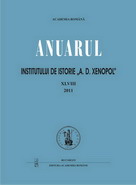Diplomaţia germană şi neutralitatea românească (1914-1916)
GERMAN DIPLOMACY AND ROMANIAN NEUTRALITY (1914−1916)
Author(s): Claudiu-Lucian ToporSubject(s): History, Diplomatic history, Military history, Pre-WW I & WW I (1900 -1919)
Published by: Editura Academiei Române
Keywords: diplomacy;neutrality; Central Powers;World War I; Ionel Brătianu
Summary/Abstract: After a long period in which it had enjoyed the protection of Germany and its allies, Romania refused to honour its obligation of entering the war. Romania’s neutrality was always seen as a temporary state, as nobody doubted that, sooner or later, the country would enter the battlefield wherever its interests would weigh the heaviest. The German diplomats experienced the evolution of Romanian neutrality in a negative manner. They have always viewed it as being ill-willed, unfriendly, hostile even. This almost evil perception of it was the result of an endless row of skirmishes, incidents and press campaigns that had eroded for good any trust in the real intentions of the Brătianu cabinet and brought into the discussion King Ferdinand’s worrying passiveness. The German diplomacy received a stern reply. It faced two major crises in the management of Romanian neutrality. The first occurred in September 1914, when, capitalising on the successes had by the Russian army of the Galician front, Romania was showing signs of willingness to cooperate from a military point of view. Cooperate, but with whom? With the Triple Entente or with the Central Powers? The second important crisis concerning Romanian neutrality was experienced by Germany in the run-up to Italy’s entry into the war on the side of the Entente and immediately afterwards. Again, the component factors pertain to the impression created among the public opinion. Italy’s intervention in the war could not have gone unnoticed. It encouraged the pressures made by the politicians who were pointing to the spectre of war against Austria-Hungary. The Romanian government would have found it increasingly hard to resist the pressures without the concessions and the courtesy acts of Germany and its allies. Before Romanian entered the war (1916), neutrality proved to be more valuable than military cooperation. The German diplomats assessed correctly all crisis situations, but the more important initiatives were always taken in a risk zone. Their mission was a difficult one: to turn Romania towards the Central Powers. The success would have brought closer the victory on the Eastern front and would have concentrated all resources on the Western front. This endeavour was not a success, but the explanation for the failure remains debatable. One must analyse in an honest manner the hypothesis of a failed cooperation with the other allies. The lasting impression is that Austria-Hungary did not support German initiatives enough. But what could it have done, more that it actually did? The proposals negotiated between Berlin and Vienna were never taken seriously in Bucharest. Brătianu knew from day one he would cooperate with Russia. From there onwards, all was just a matter of time. Two years passed until what had been anticipated from the start of the war actually happened. Romania would not stay neutral forever. Instead, it would intervene in a war for its national ideal. Italy had done the same thing it its moment of crisis. Also, the hypothesis of competencies must be analysed thoroughly. Were the German diplomats prepared enough in order to understand and to manage the politics of the Romanian neutrality? Despite the high turnover of plenipotentiaries, the German diplomacy assessed flawlessly the route the Romanian government would take. No-one doubted for a moment Brătianu’s duplicity. The information was timely and of good quality. Most of the time official diplomacy wasn’t the only method being used. The circuit of diplomatic mail also reveals ramifications of dynastic diplomacy various other emissaries get involved, there were less visible characters at play – spies, secret agents etc. Apart from the thoroughly documented reports sent by plenipotentiary Bussche, the military attaché also sent letters to Berlin. The latter had his own sources of documentation, which he analysed carefully and interpreted accurately. Undoubtedly, Germany tried hard and proved patient. Everyone understood what the stakes were. The battle was, however, lost on another front. This was a direction of conduct that did not pertain to the times of war. Trusting King Carol’s iron hand, the German diplomacy did not attempt early to prepare Romania for the hypothesis of a definitive neutrality. It was always believed, despite all the warnings, that, irrespective of political colour, the Bucharest government would cooperate. This was an error that nobody was able to correct afterwards. When Berlin realised where Romanian was truly going, the game was already over.
Journal: Anuarul Institutului de Istorie »A.D. Xenopol« - Iaşi
- Issue Year: LI/2014
- Issue No: 51
- Page Range: 213-224
- Page Count: 12
- Language: Romanian

